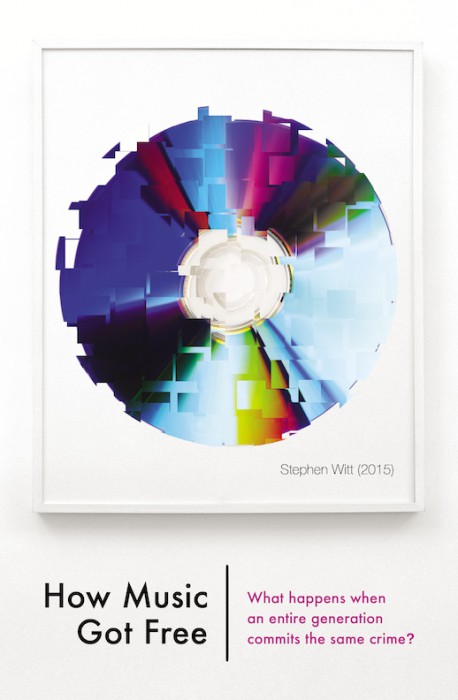How Music Got Free
by Stephen Witt
Bodley Head, hardback. Published 18 June.
Review by Ben Myers
Hundreds of music files will have been illegally downloaded and shared by the time you’ve read this review; thousands in the time it took to write it. To date in total, 100,000,000,000 and counting, at a cost of $21,000,000,000 to the artists who created the works and the labels who financed them. This is, author Stephen Witt notes, a crime committed by an entire generation.
And it is a generational thing as the 36 year old observes that “my older friends regarded piracy with scepticism, and sometimes outright hostility”. There are still some of us even just a couple of years older than the author whose musical purchase power has straddled both sides of the great internet explosion; who accrued substantial vinyl and CD collections before we’d ever been online and therefore still somehow view a song as more than a file on a hard-drive. But we are a dying breed, a minority in a world of consumer cultural entitlement.
Perhaps growing up viewing music as precious cultural artefact rather than a ripped and ripped-off entity that exists only in the digital ether has ensured we still have a semblance of conscience about the artist getting paid. Am I alone in never having consciously sought out illegal downloads? Perhaps. Reading this study though, the full extent to which high-end pirating and the music industry’s desperate and archaic attempts to prevent it has completely changed the business, both – for the worse and the better – is laid bare in fascinating detail.
Witt himself first acknowledged the extent of the pirating boom when he considered his own 15,000-album strong collection, downloaded entirely for free, and realised that he hated ABBA yet owned music of their music and couldn’t name any of the ZZ Top albums he had accrued, much less actually listened to.
Then again conscience and the music industry have never been comfortable bedfellows and this impeccably executed piece of high-level research journalism is the story of the modern American music business – an industry which, at times, you can’t help think gets everything that it deserves. Here is a world where “best” means “best-selling” and everything else is academic: “the best album of 1993 wasn’t Enter The Wu-Tang or In Utero but the soundtrack to The Bodyguard,” he observes. “And so the best album of 1995” – the year of the first MP3 – “was therefore Hootie & The Blowfish’s Cracked Rear View. The critics might howl in protest, but the people bought the album, and at time at Warners, that was all that mattered.”
Witt tells the tale of exactly how and why every major release in the earlier years of the millennium got leaked by focussing on three key characters: Karlheinz Brandenburg, a typisch Deutsch mathematical talent, who lead a small research team for the Fraunhofer Society in an attempt to compress music without compromising sound quality. He is one of the good guys, a technological hero. Then there is Bennie Lydell Glover – Dell – a young black man with a fondness for motorbikes, guns, hip-hop and emerging technologies, who funds his interests and hobbies working twelve hour shifts shrink-wrapping and boxing up pre-release CDs at the heavily security protected Polygram packing plant in North Carolina. There too is a perverse sense of heroism to what he does.
At the top of the chain is Doug Morris, former president of Atlantic Records and then North American head of Warner Music Group, who amongst other achievements helped usher in the rise of gangsta rap via Snoop, Tupac and Dre, despite much opposition from the conservative political establishment. The scientific genius, the grunt-worker and the fat cat, then. Musicians – the artists – it should be noted – are minor players in this story.
How Music Got Free weaves together these three narrative strands into the telling of crime that is full of moral ambiguities – a crime, in fact, in which many of the perpetrators (music-hungry fans, essentially) are not even aware they are doing much at all wrong. Besides: after decades of being over-charged and fleeced by companies shilling over-priced products – as the CD album was for many years – wasn’t it time the people ripped them off too? But what of the artists? Kanye West can take the hit from leaked albums and music being shared for free but smalltown punk band Black Dracula (or whoever) just lost the few thousand potential sales that would have sustained a tour and the creation of their next album, so it’s back to dunking onion rings and pounding the telesales for them. A moral minefield.
Like any great crime writer or investigative reporter Witt sets scenes, considers motives, focuses in one those who exist in the shadows and places every development in the correct context, and somehow manages to turn what seems on paper a dull prospect – the rise of the MP3; the downturn of a bloated industry – into an utterly compelling read.
It’s also a book that keenly reminds that the big business of music production is no different to oil trading or arms dealing; one where the smoothest talkers or most cynical movers rise to the top – epitomised in the UK perhaps by figures such as Simon Cowell, who metaphorically feed off young blood, before swiftly casting the empty husks of spent cadavers aside. There’s no room for soul here; only ego.
It’s a world that Witt writes is summed up by an eternal truth of showbusiness: “The secret of life is honesty and fair dealing. If you can fake that, you’ve got it made.”
How Music Got Free is published on 18 June. Pre-order a copy from the Caught by the River shop at the special price of £16.00
